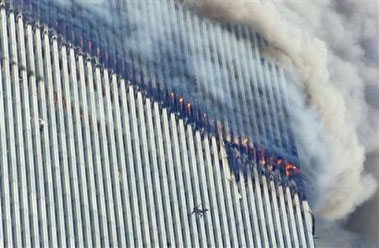NEW YORK - Emergency operators listening to trapped
callers' heartbreaking pleas from the burning World Trade Center repeatedly said
help was on the way while they struggled with crashing computers, utter
confusion and their own emotions, several hours of 911 calls released Friday
show.

A person falls from
the north tower of New York's World Trade Center as another clings to the
outside, left center, while smoke and fire billow from the building, in
this file photo of Tuesday Sept. 11, 2001.
[AP] |
In releasing the 130 calls, city officials edited out the voices of those who
sought help. But the police and fire dispatchers often repeated the callers'
words, reflecting the fear and chaos of the morning of Sept. 11, 2001.
The first call came seconds after
terrorists flew a hijacked jetliner into the north tower of the trade center at
8:46 a.m. A second plane struck the south tower 17 minutes later, and by 10:28
both towers had collapsed, leaving 2,749 people dead.
Dispatchers assured the callers — most of them on floors above the burning
plane wreckage — that help was coming, or already there. In many cases, they had
little to offer but compassion.
"OK, ma'am. All right," a fire dispatcher told a caller at 9:05 a.m., two
minutes after the second tower was hit. "Well, everybody is there now. We're
trying to rescue everybody. OK?"
Twelve minutes later, another dispatcher told a frantic caller trapped on the
105th floor of the south tower to instruct people to put wet towels over their
mouths, lie on the floor and not open the windows.
"We are trying to get up there, sir. Like you said, the stairs are collapsed,
OK?" the dispatcher said. "I know it's hard to breathe. I know it is."
The transcripts and nearly nine hours of audio recordings were released after
The New York Times and relatives of Sept. 11 victims sued to get them. An
appeals court ruled last year that the calls of victims in the burning twin
towers were too intense and emotional to be released without their families'
consent.
As a result, the transcripts held long blank spaces where the callers' words
would have appeared.
Often, it was clear from conversations between police
and fire department operators that they were not sure what had occurred. At one
point a police operator told a fire dispatcher that a helicopter had hit one of
the towers.